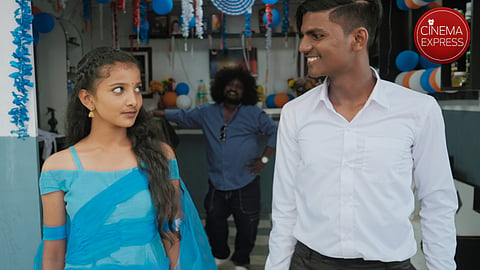Hebbuli Cut Movie Review: A tender lens on caste, innocence, and belonging
Hebbuli Cut(3.5 / 5)
Navella Ondu, which translates as 'We are all one'—part of the original phrase faded, these words remain scrawled on a village wall, echoing the final impression of Hebbuli Cut, a powerful statement that resonates long after the credits roll. It makes you wonder whether the said idea of unity really exists in practice. Prior to reaching that peaceful assertion, we will have to go back to the starting point—into the gradual reveal of a richly moving narrative that never screams its politics but allows them to permeate into your skin, quietly, authentically.
Operating with a story, credited to Ananth Shandreya, director Bheemarao P introduces the film not with declarations but with poetry: the gentle tracing of a flower on water, lilting music, and a village in Karnataka that breathes life. Every day, characters drive the story here, and among them are young Vinay (Mounesh Nataranga, his family, his old friend Rafique (Punith Shetty Allama), who runs a local garage, and Channa / Chananna (Mahantesh), the self-important owner of Modern Men's Buty Parlar. Beyond these individual stories, Hebbuli Cut deeply explores social, cultural, and personal barriers, and the tiny yet significant efforts required to overcome them.
Director: Bheemarao P
Cast: Mounesh Nataranga, Mahantesh Ananya MK, Mahadev Hadapad Uma YG, and Punith Shetty Allama
At the centre of everything, the film is a commentary on untouchability, not as a paragraph in a textbook but as something said in half-sentences and silences, in who sits in a chair and who doesn't. There is no bloodshed, no big demonstration, just the insistent quiet of exclusion, and a child's desire to be noticed. Vinay, the young protagonist of the film, is innocence personified and has charm coming out of every pore. He is someone who is fascinated with movies, especially Hebbuli and its hero Kichcha Sudeep, whose Hebbuli Cut becomes an obsession for him. Spotting a picture of Sudeep in the bag of a classmate (Ananya MK), a girl who brings to his face a grin, Vinay makes up his mind to get that haircut done. But the haircut is not just a style; it is a metaphor for dignity, visibility, and inclusion. To wear it is to declare: "I matter." But Vinay is the son of a cobbler. His family's caste ranking quietly determines the way others treat him. His friends don't tease him, but caste sneaks in through looks, pauses, and the hierarchies. Channanna, the man behind the Modern Men's Buty Parlar, is the representative of this. He's no thug; he regards himself as an artist, managing his parlour with pride, where blade and scissors are sacred. But when Vinay desires the Hebbuli Cut, Channanna's bias materialises not in denial but in hesitation—and cost: ₹500. Courteous, professional, but biting. Vinay's family can't pay for this extravagance. Channanna's unwavering insistence on his asking price highlights how discrimination can subtly manifest as policy, rather than overt malice. Yet Vinay won't accept the cut from a street corner barber. His ideal is particular; he won't compromise, and he goes to great lengths, working tirelessly for the money, all to secure his place in the chair at Modern Men's Buty Parlar for that coveted Hebbuli Hair Cut. Rafeeq, his older friend, is his silent ally, not by 'standing up' for Vinay, but by standing alongside him. Rafeeq's own identity, intimated through name and demeanour, implies marginalisation. He never makes himself the centre of things. His power is in his empathy, in understanding that belief in oneself starts when someone else believes as well.
Hebbuli Cut allows the story to unfold and simply follows Vinay's moments. It queries: who is entitled to dream, and who is entitled to be perceived in that dream? The boy's wish to resemble his idol is a quiet act of rebellion, a search for self-value in a society that frequently deprives him of it. The movie shines in its particulars: playground gossip, whispered humour, and the easy beat of country life. And there's sorrow, too, but no over-emotion. Even the pacing, which occasionally slows, feels deliberate, mirroring the gradual and persistent effort needed to shift entrenched attitudes. By the time it's over, the question isn't whether or not Vinay gets the haircut. It's whether or not we understand why it matters. Who can walk into a salon without hesitation? Who can feel invited in, not just to places, but to dreams? It ends on a wall inscribed with the words, "We are all one." But Hebbuli Cut resists the temptation of slogans for comfort. It indicates how far we remain from embracing that togetherness. Untouchability can no longer proclaim itself by name, but it continues to exist in prices, looks, and gatekeeping. This is an intimate movie with a generous heart. It doesn't demand change; it gently reveals the need for it. And in doing so, it reminds us: a child’s dream is never just a dream. It is a mirror to the world we’ve built, and a map to the world we must unbuild.


